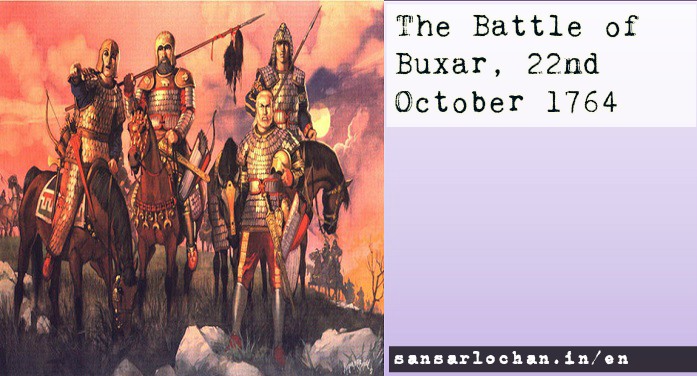Background of the Buxar War
Behind the battle of Buxar, there is a tale of greed and conspiracy. Mir Qasim, the son-in-law of Mir Jafar, was an ambitious man. He entered into a covert alliance with the English offering them gold and more powers, if they helped him to capture the throne of Mir Qasim. The company and the Britishers found in the offer a golden opportunity to fill their coffers. A treaty was entered into (September, 1760) between the company and Mir Qasim whereby the East India Company agreed to place Mir Qasim on the throne and in return the areas of Burdwan, Midnapore and Chittagong were to be assigned to it.
As soon as the treaty was signed, the company started charging Mir Jafar with gross neglect of the administration. Mir Jafar was helpless because he was not in a position to resist the company. He relinquished the masnad and Mir Qasim became the Nawab. Hefty presents again passed to the company’s servants.
Mir Qasim and the English
The English were soon disillusioned because they discovered that Mir Qasim was a man of extraordinary abilities and strength of character who would not tolerate any interference in his affairs and above all would not allow the company to exhort money from him. He had great administrative abilities. With admirable dexterity he suppressed the refractory Zamindars of Bengal and Bihar and established a strong military organisation and a rich treasury. The English did not mind much in this regard. But when he took up the question of internal trade and its reform, hostilities between him and English began to emerge. The company’s servants and agents where in the practice of abusing their trading privileges and making huge profits. Mir Qasim wanted to put an end to this state of affairs and his strong attitude was resented by the English.
The firmaan of Farrukhsiyar of 1717 on which the English based their claims had granted to the company the privilege of free sea-borne trade. But taking advantage of disturbed condition of the times, the company’s servants had extended the privileges for their own private trade of all kinds. Such affairs damaged the interests of the Indian merchants.
The Nawab complained to the Council at Calcutta about the illegitimate doings of the company and its staff. But the majority of the Council held that the English were well within their rights. Then Mir Qasim in great desperation as an alternative abolished all inland customs and covered Bengal into a land of free trade. But this action too could not humor the English because they thought that it would place their goods on the same footing as the goods of Indian merchants. They did not want the abolition of inland duties and yet they were unwilling to pay them. Such was their unreasonable attitude.
War between Mir Qasim and English
They threatened war against Qasim if he did not restore the duties. Matters were precipitated by Ellis, the English agent at Patna who attacked the city and captured it. Mir Qasim’s forces soon recovered the city and seized 200 Europeans as prisoners. War between Mir Qasim and English started in earnest. He was deposed and Mir Jafar who was ready at hand was again installed in the gaddi with the usual round of presents. Mir Qasim was defeated at Gherla and Udhuanala in August 1763 and fled towards Oudh.
Mir Jafar re-imposed the abolished internal duties, promised to make good the losses due to war of Mir Qasim, as if he was to blame, and allowed free trade to the English except for a duty of 2%, on salt. He found himself in the midst of serious difficulties, his masters pressed him for money and would not give up a pie out of their demands. He died early in 1765.
The Battle of Buxar
Mir Qasim after his defeat found refuge in Oudh. Shah Alam, the Mughal Emperor was also living there in state of exile. Mir Qasim persuaded Shuja-ud-dowla to enter into an offensive alliance against the English and finally a combined force of the armies of Mir Qasim, the Nawab Wazir and Shah Alam proceeded towards Bihar. After a series of indecisive battles the two armies met at Buxar in October 1764 in which the English under Major Hector Munro won the battle. Mir Qasim fled and after a life of wandering died at Delhi in 1777.
Importance of Buxar
Buxar completed what Plassey had begun and as Ramsay Muir remarks “it finally rivetted the shackles of the company’s rule upon Bengal. It announced not only the defeat of the Nawab of Bengal but that of the Emperor as well as of the Nawab Wazir of Oudh. The Emperor passed into the hands of the company and Oudh lay at its feet.”
Read also: –
Akbar’s Religious Policies and Ideologies
Social Reform Movements in Modern Indian History
